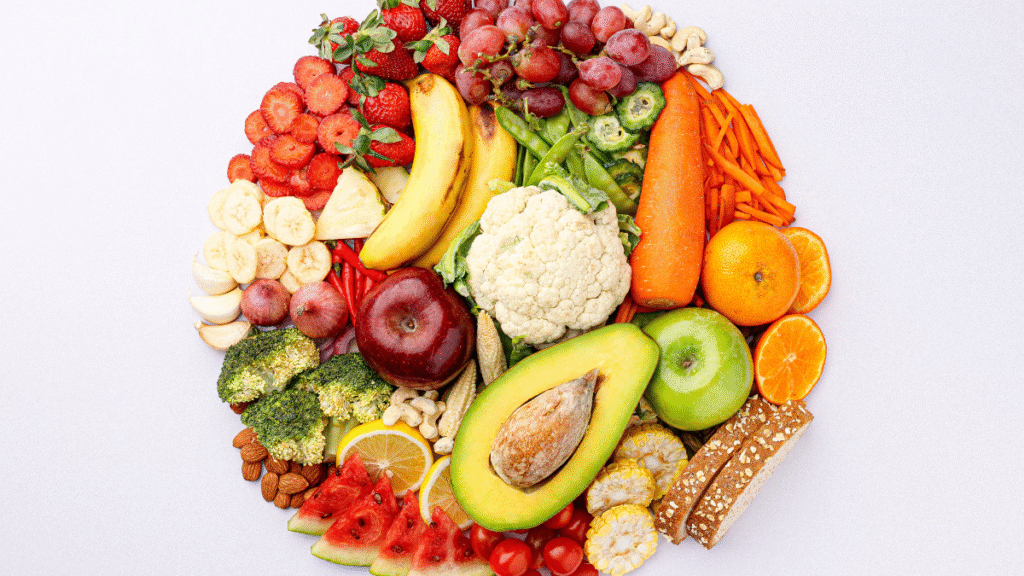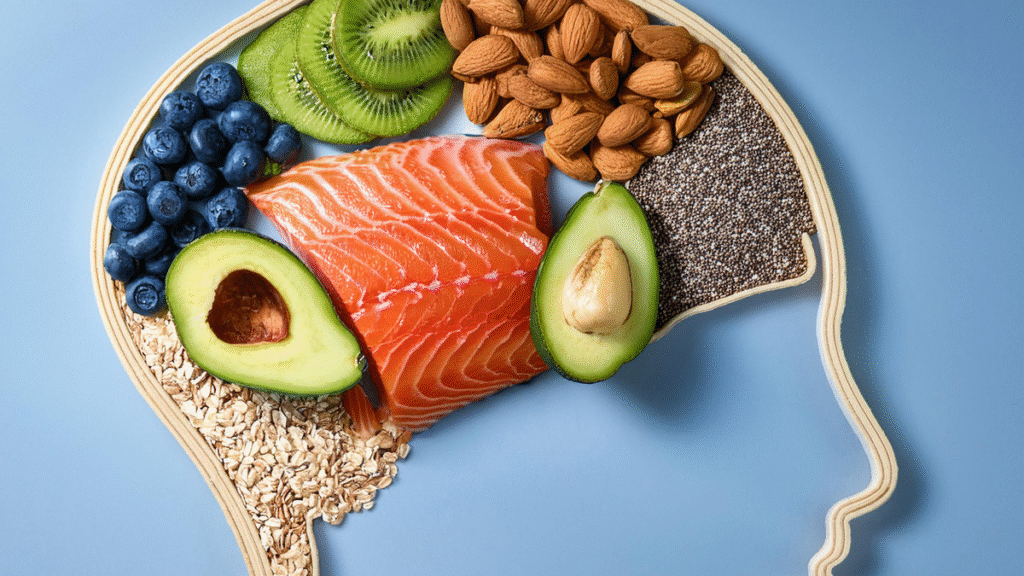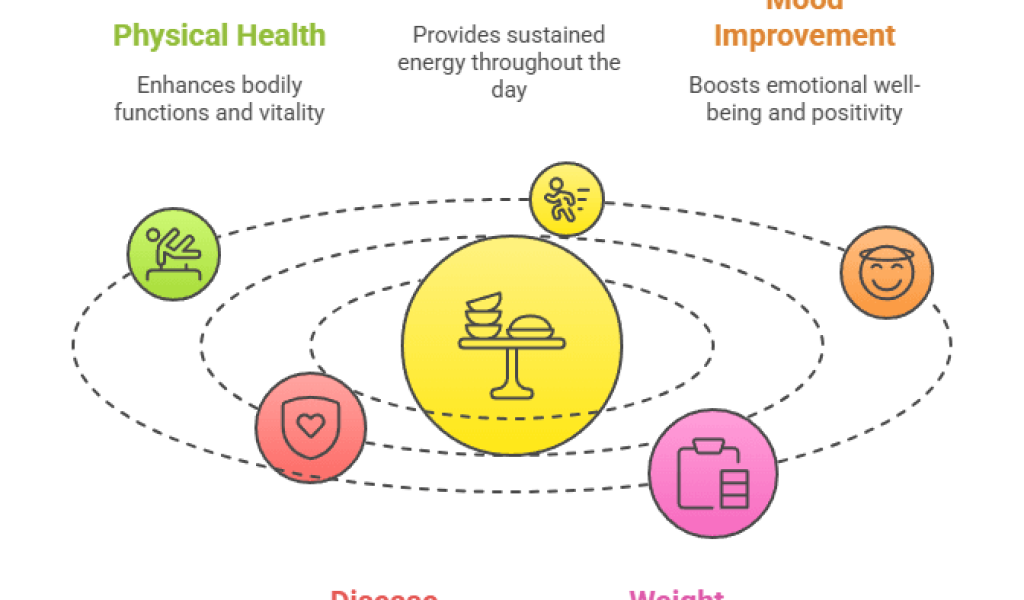Why Eating Healthy Food Changes Your Life—Backed by Science

Discover the real benefits of eating healthy food and how it can boost your energy, mood, and lifespan—science says it works.
Eating healthy food isn’t just about losing weight or looking appealing. It’s about feeling better every day—from having more energy in the morning to staying focused at work and keeping your immune system strong. What you eat affects your body, your brain, and even your mood. And what’s even more exciting? Science now backs up what our parents always told us: eating healthy really does change your life. In this article, we’ll explore how making simple changes to your plate can lead to a longer, stronger, and happier life.
In this fast-paced world, everyone is busy with their lives and unable to take care of their health. Eating healthy food is the first and most important step for everyone. If you change your eating habits, you will notice a significant improvement in your health with minimal effort.
You can gradually modify your habit and keep it up for long-term health without investing additional time or money. Everyone should adopt healthy eating habits, and if you eat fresh, nutrient-rich food that is prepared at home, your children and other family members will want to eat it.
Nutrition plays a vital role in maintaining a healthy lifestyle. A balanced diet provides your body with the necessary nutrients, vitamins, and minerals to function properly. A balanced diet leads to good health.
It refers to taking the proper amounts of carbohydrates, proteins, fats, vitamins, and minerals. Eat simple, homemade food. If you are eating a regular day-to-day diet of different kinds of dals and rice, whole-grain chapati, fruits, vegetables, milk, and paneer curd, then there is no need for diet supplements.
If you take a proper, simple, homemade diet, your body will get complete nutrition. You can add to your diet all seasonal fruit, vegetables, and other edible items according to the seasons. If you eat according to the season, your body can protect you from seasonal diseases. Suppose in the winter season you plan your diet according to easily available and highly nutritious food products.
Healthier eating is not merely a choice; it is essential for maintaining overall good health. Our physical health, mental focus, energy levels, and lifespan are all directly affected by the food we eat. Eating a balanced meal full of important nutrients can prevent an unhealthy life.

Benefits of Eating Healthy Food
1. Eating Healthy Food Boosts Your Immune System
A strong immune system helps your body fight off infections, viruses, and diseases. Eating a balanced diet rich in vitamins, minerals, and antioxidants gives your body the tools it needs to stay healthy. Foods like citrus fruits, leafy greens, nuts, seeds, and berries contain powerful nutrients—such as vitamin C, zinc, and flavonoids—that protect cells and reduce inflammation.
Bullet points:
Eat citrus fruits like oranges and lemons for vitamin C
Add spinach, kale, and broccoli for immune-boosting antioxidants
Include nuts and seeds for zinc and healthy fats
Avoid processed foods that weaken immune response
2. Healthy Eating Makes Your Body Stronger and Fitter
Eating a nutrient-rich diet helps your body perform at its best. Proteins repair tissues and build muscles, fibre improves digestion, and healthy fats support brain and heart health. When you eat whole foods—like fruits, vegetables, lean meats, and whole grains—your body gets everything it needs to grow stronger and function properly. You’ll also notice better skin, more stamina, and faster recovery from illness or injury.
Bullet points:
Eat lean meats, eggs, or legumes for protein and muscle repair
Add fiber-rich foods like oats, beans, and veggies for digestion
Include omega-3-rich foods like flaxseeds or fatty fish for heart health
Choose whole grains over processed carbs for lasting energy.
3. Healthy Food Supports Better Mental Health
What you eat doesn’t just affect your body—it also impacts your brain. Foods rich in omega-3s, magnesium, and folate can improve memory, reduce anxiety, and support emotional stability. When you avoid processed foods and eat more whole, nutrient-rich meals, your brain functions more clearly, and your mood becomes more stable. Mental health starts in the gut—and healthy food can truly help you feel more focused, calm, and emotionally balanced.
Eat walnuts, chia seeds, and flaxseeds for omega-3 fatty acids
Include leafy greens and legumes for folate and magnesium
Add fermented foods like yogurt or kefir for gut-brain connection
Reduce sugar and processed snacks to avoid mood swings
4. Eating Healthy Makes It Easier to Maintain a Healthy Weight
Managing weight becomes much easier when you eat nutritious, whole foods instead of processed junk. A healthy diet keeps your metabolism active, balances blood sugar, and helps you feel full longer—so you’re less likely to overeat. When you fill your plate with real food like fruits, veggies, whole grains, and lean proteins, your body naturally finds its balance without extreme dieting or calorie counting.
Bullet points:
Choose whole foods over packaged snacks to avoid empty calories
Add fiber-rich meals to feel full longer and reduce cravings
Avoid sugary drinks and trans fats that slow down metabolism
Eat regular meals to prevent overeating later in the day
5. A Healthy Diet Reduces the Risk of Chronic Diseases
Many long-term illnesses—like diabetes, heart disease, and high blood pressure—are linked to poor eating habits. When you eat a diet rich in whole foods, healthy fats, and fiber, you reduce inflammation and support your body’s natural healing systems. Consuming fruits, vegetables, whole grains, nuts, and legumes can protect your heart, stabilize blood sugar, and lower the risk of disease over time.
Bullet points:
Eat fruits and vegetables daily for antioxidants and fiber
Include whole grains like oats and brown rice for heart protection
Add nuts, seeds, and olive oil for healthy fats
Avoid processed meats, sugary foods, and excess sodium
6. Healthy Eating Increases Energy Levels Naturally
Forget energy drinks and sugar crashes. When you eat balanced meals packed with complex carbs, proteins, and healthy fats, your body gets steady fuel throughout the day. Whole foods release energy slowly, keeping you active, alert, and less tired. It’s not about eating more—it’s about eating better to feel truly energized.
Bullet points:
Eat oatmeal, bananas, or sweet potatoes for slow-releasing carbs
Include lean protein like eggs, lentils, or fish in every meal
Snack on nuts, seeds, or trail mix instead of chips
Stay hydrated—water helps convert food into energy
7. A Good Diet Improves Sleep Quality
What you eat during the day can affect how well you sleep at night. Foods rich in magnesium, tryptophan, and B vitamins help calm your nervous system and support melatonin production. Cutting back on caffeine, sugar, and heavy dinners can also make a big difference. A healthy diet leads to better, deeper sleep—and a more refreshed morning.
Bullet points:
Eat foods like almonds, bananas, and oats for better sleep
Avoid coffee, chocolate, and spicy food in the evening
Choose light, balanced dinners—avoid greasy or heavy meals
Stay consistent with meal timing to help your body clock
8. Eating Healthy Food Improves Longevity and Quality of Life
A healthy diet doesn’t just help you feel good now—it adds years to your life. Studies show that people who eat more fruits, vegetables, whole grains, and healthy fats live longer and suffer fewer chronic diseases. Healthy food keeps your heart strong, your brain sharp, and your energy levels high as you age. It’s not just about living longer—it’s about living better.
Bullet points:
Eat a colorful variety of plant-based foods daily
Limit processed meat, refined sugars, and deep-fried items
Stay consistent with healthy habits for long-term benefits
Combine healthy eating with exercise and sleep for full wellness

Why Does Everyone Need to Eat Healthy Food?
Eating healthily is important for people of all ages, not just exercise fans. A healthful diet is important for everyone, from growing kids to working adults to older people.
Children: Healthy food helps them grow, develop their brains, and keep their bones strong. Preventing obesity and teaching good eating habits for life are two benefits.
Adults: Eating healthy food lowers stress, boosts productivity, and keeps you healthy generally. Lifestyle-related diseases are avoided, and people live longer.
Old-age persons: their metabolism slows down. This makes eating nutrient-dense foods even more important for keeping their heart healthy, their movement, and their brains working well.
Incorporating Healthy Eating Food into Everyday Life
Pick whole foods over processed choices: Replace processed or packaged foods with fresh fruits, veggies, and lean proteins.
Stay hydrated: water is important for cleaning out your body, digesting food, and removing toxins.
Balance macronutrients: Make sure that meals have the right amount of healthy fats, carbs, and proteins.
Practice Portion Control: Eating too much can make you gain weight for no reason. Mindfully and moderately eating helps the body digest food better and absorb nutrients.
Limit your intake of sugar and sodium. Eating too much sugar can cause diabetes, and eating too much salt can cause high blood pressure. Instead, use natural flavours and spices.
Include more fibre. Fibre helps your body digest food and keep your gut healthy. Good sources include whole grains, beans, nuts, and veggies.
Cook at Home: Making meals at home gives you more control over the ingredients and serving sizes, which encourages healthy eating.
Final Thoughts: Why Healthy Eating Is a Long-Term Investment in You
Changing how you eat doesn’t mean giving up everything you love—it means choosing food that helps you live better, not just longer. A healthy diet supports your energy, mood, sleep, weight, and overall health in ways no quick fix ever will. You don’t need to be perfect—just consistent. Start by making one better food choice today. Over time, those small steps can lead to big results.
FAQ Section for healthy food
Q1. What are the main benefits of eating healthy food?
Healthy food boosts immunity, improves energy levels, supports mental health, and helps you manage your weight. It also reduces the risk of long-term diseases like diabetes and heart problems.
Q2. Can eating healthy improve my mood?
Yes. Foods rich in omega-3s, magnesium, and vitamins can reduce anxiety and help regulate mood. A balanced diet supports brain function and emotional well-being.
Q3. How does healthy eating affect energy levels?
Whole foods like oats, bananas, and nuts provide steady energy throughout the day. Unlike sugary snacks, they don’t cause crashes and keep you alert and active.
Q4. What should I avoid to eat healthier?
Avoid processed foods, added sugars, trans fats, and excessive salt. These increase the risk of weight gain, low energy, and chronic illness.
Q5. Can healthy food really prevent diseases?
Yes. A diet rich in vegetables, fruits, whole grains, and healthy fats can lower your risk of heart disease, type 2 diabetes, and certain cancers over time.
Ready to Take the First Step?
Explore our full guide on How to Live a Healthy Life: 8 Daily Habits for Long-Term Wellness.
Bookmark this article, share it with someone you care about, and come back often for more health tips that make a real difference.
